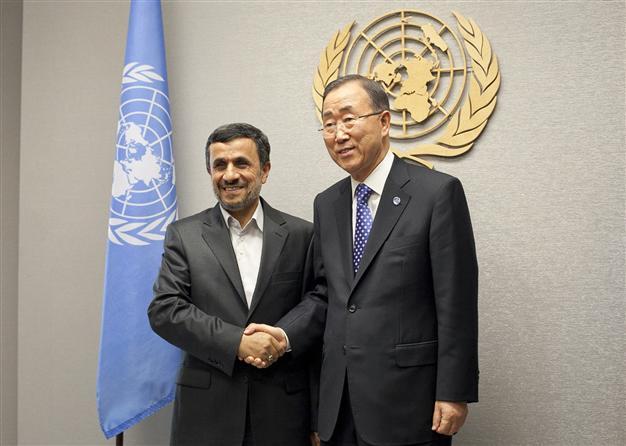U.N. chief warns Iran's Ahmadinejad on fiery rhetoric
UNITED NATIONS - Reuters

Mahmoud Ahmadinejad (L), President of Iran, shakes hands with United Nations Secretary General Ban Ki-Moon (R) before their meeting September 23, 2012 at UN headquarters in New York. AFP Photo
U.N. Secretary-General Ban Ki-moon warned Iranian President Mahmoud Ahmadinejad of the dangers of incendiary rhetoric when two men met in New York yesterday before this week's annual gathering of world leaders at the U.N. General Assembly.
"The secretary-general drew attention to the potentially harmful consequences of inflammatory rhetoric, counter-rhetoric and threats from various countries in the Middle East," Ban's press office said in a statement.
Amir Ali Hajizadeh, a brigadier general in the Islamic Revolutionary Guard Corps, was quoted as saying on Sunday that Iran could launch a pre-emptive strike on Israel if it was sure the Jewish state was preparing to attack it.
Israeli Prime Minister Benjamin Netanyahu has hinted that Israel could strike Iran's nuclear sites and criticized U.S. President Barack Obama's position that sanctions and diplomacy should be given more time to stop Iran getting the atomic bomb.
Iran denies that it is seeking nuclear arms and says its atomic work is peaceful, aimed at generating electricity.
The U.N. statement said Ban told Ahmadinejad that Iran should "take the measures necessary to build international confidence in the exclusively peaceful nature of its nuclear program."
The two men also discussed Syria. Iran has been accused of using civilian aircraft to fly military personnel and large quantities of weapons across Iraqi airspace to Syria to aid President Bashar al-Assad in his attempt to crush an 18-month uprising against him, according to a Western intelligence report.
"The secretary-general stressed the grave regional implications of the worsening situation in Syria and underlined the devastating humanitarian impact," the statement said.
Speaking to reporters in New York, German Foreign Minister Guido Westerwelle said that "to increase pressure and to increase the isolation of the regime of Assad is one of the goals this week."
On Wednesday, Westerwelle will chair a ministerial meeting of the U.N. Security Council on the Arab Spring at which Syria is expected to be a major theme.
Pressure on SyriaBan said last week that Syria would be one of the main topics of the 193-nation General Assembly meeting. Other diplomats said the furor caused by an anti-Islam film made in California would also be a major issue.
The U.N.-Arab League mediator in the Syria crisis, Lakhdar Brahimi, will address the Security Council on Monday in a private meeting. Brahimi met with Ban on Saturday to discuss the his recent trip to Damascus, where Brahimi met with Assad.
"(Ban and Brahimi) focused on how to address the appalling levels of violence in Syria and how to progress towards an inclusive political solution that will address the legitimate demands of the Syrian people," the U.N. press office said.
"The worsening crisis in Syria represents a steadily increasing threat to regional peace and security."
Ahmadinejad has regularly attended at the assembly since he took office in 2005. He will give his U.N. speech on Wednesday and will also speak at a meeting on the "rule of law" on Monday.
In previous years, Ahmadinejad has used his U.N. speeches to defend Iran's nuclear program and to attack Israel, the United States and Europe. He has questioned the Holocaust and cast doubt on whether 19 hijackers were really responsible for the Sept. 11 attacks on the United States in 2001.
Western envoys predictably walk out of Ahmadinejad's speeches in protest.
There will be high-level side meetings on Iran's nuclear program and Syria during the General Assembly, but U.N. diplomats do not expect either issue to be resolved soon.
